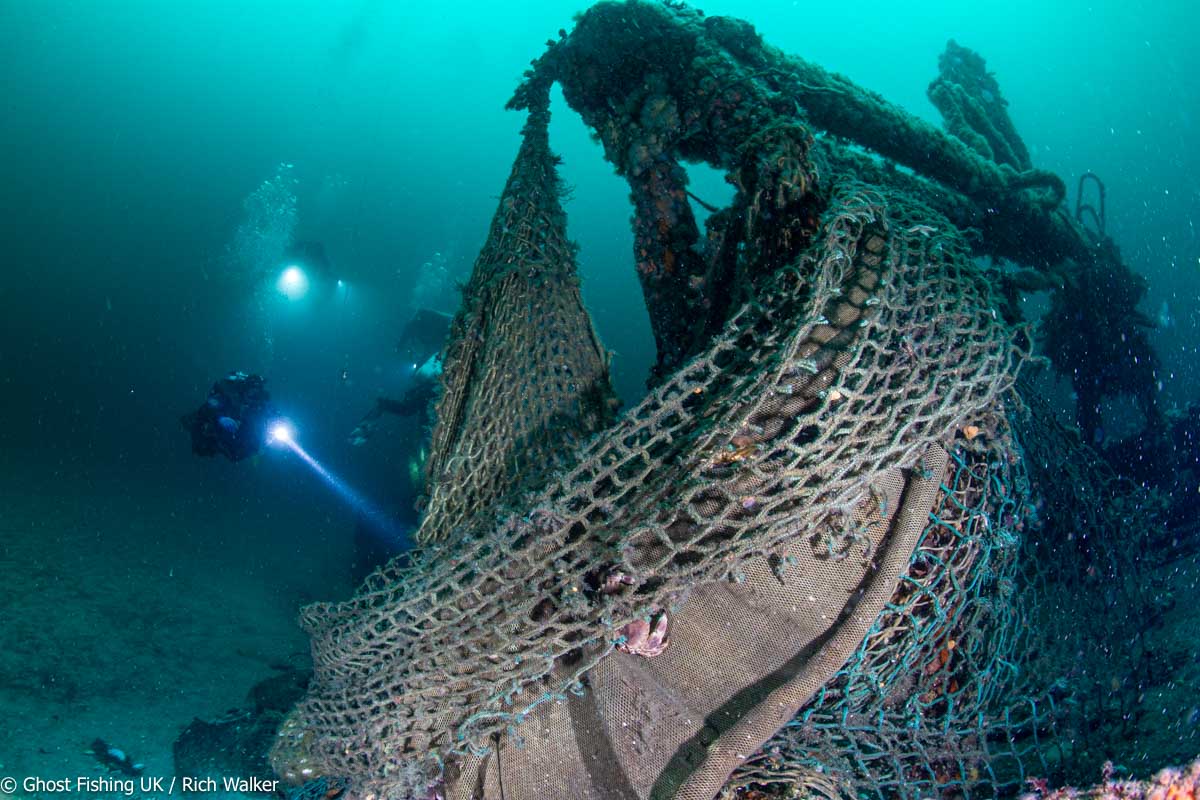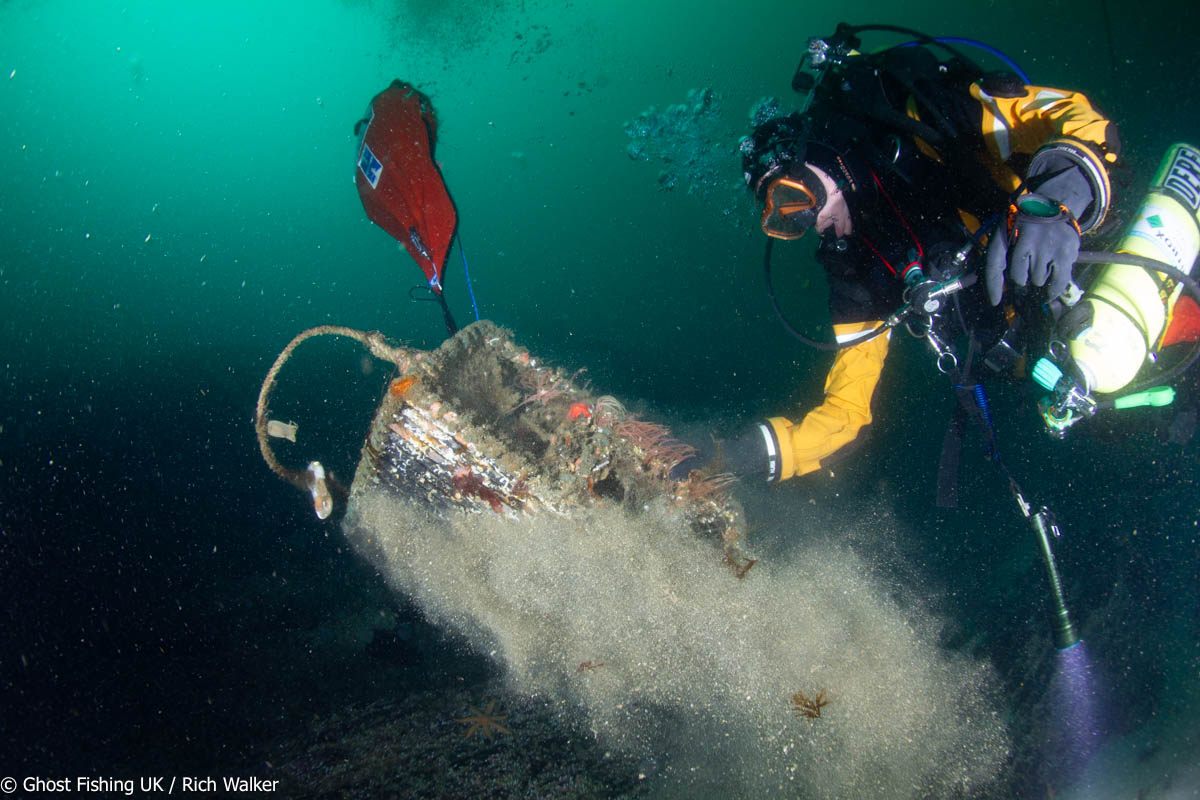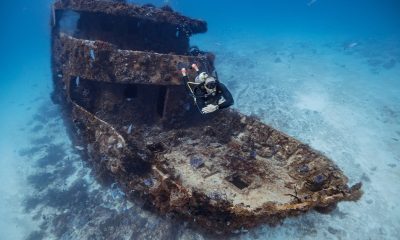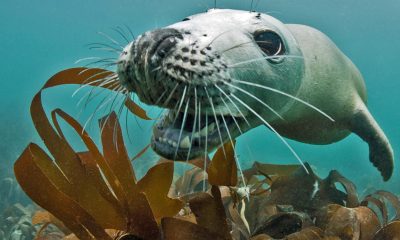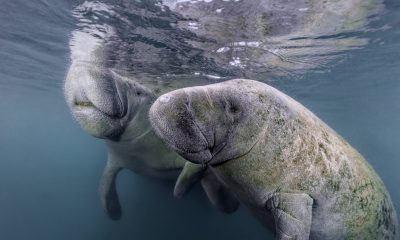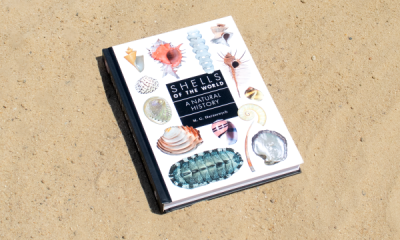Marine Life & Conservation
Divers recover 1500kg of lost fishing gear from Shetland waters
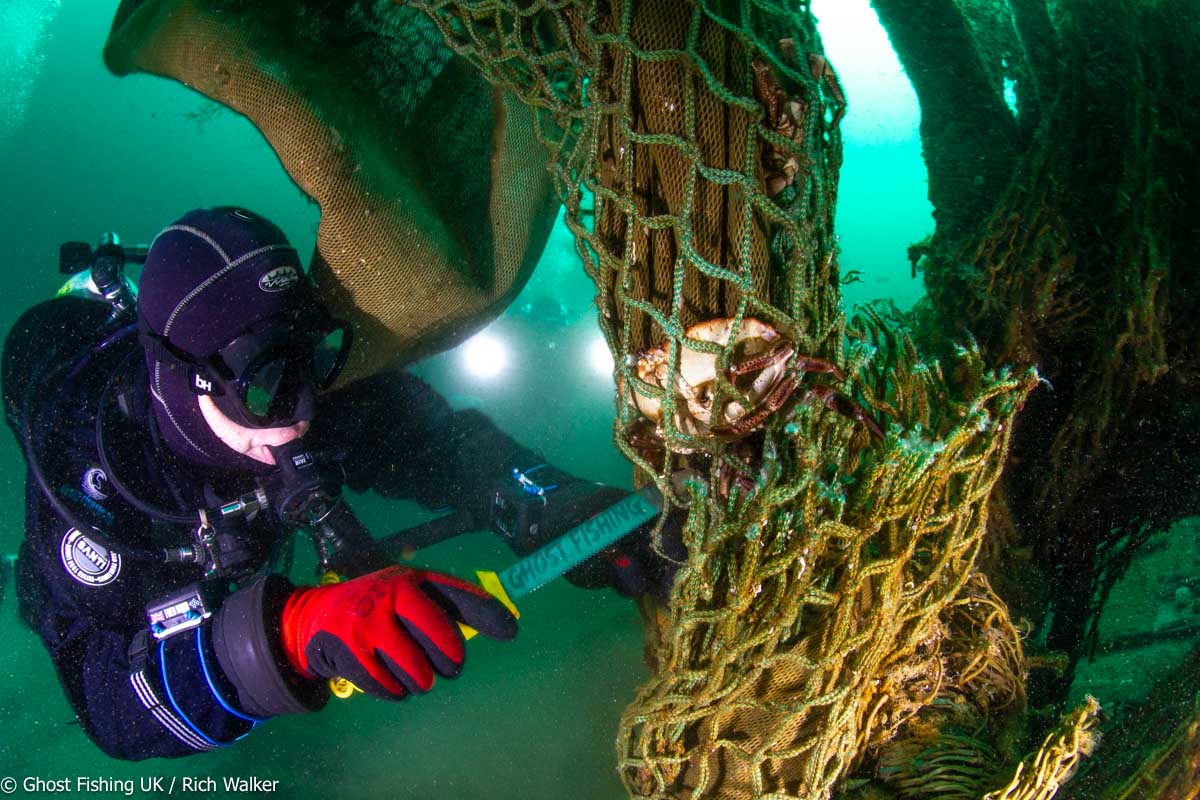
 Award winning charity Ghost Fishing UK are on their way home after a groundbreaking week, helping fishermen clean up lost fishing gear around Shetland.
Award winning charity Ghost Fishing UK are on their way home after a groundbreaking week, helping fishermen clean up lost fishing gear around Shetland.
They arrived and began diving on 6th August for one week aboard the MV Valhalla and in 6 days recovered 1500kg of lost fishing gear. It included a trawl net from the wreck of the Fraoch Ban, 41 creel pots and some keeper pots; all were returned to fishermen.
12 volunteer divers travelled to Shetland with the help of Northlink Ferries sponsoring their travel, helping out with a trip that totalled £18,000 to run.
Northlink said “We are delighted to be able to support such a worthwhile project…we hope (Ghost Fishing UK) have a good journey home. Well done to all involved. It looks like they have had a very successful time in Shetland clearing ghost gear. We are proud sponsors.”
The charity selects and trains divers themselves, all on a volunteer basis and the divers were grateful to receive support from Reel Diving and Halcyon Dive Systems who provided extra reinforcements such as extra bright pink lift bags, surface marker buoys, reels and regulators.
Trip organiser and charity trustee Christine Grosart explained “We were invited to Shetland by a group called Fishing Forward, who were concerned about the abundance of abandoned gill nets around Scottish waters which were being pulled in by their own trawlers. These nets are not used by local fishermen, yet they are causing havoc with wildlife and there are huge concerns about pollution, net dumping and littering from foreign gill netters.”
The charity is committed to working with the fishing community to try and solve the issues of ghost fishing, a phenomenon where lost or abandoned fishing gear continues to do its job, catching and killing marine life until it is removed from the sea. The charity has been heavily dependent on reports from fishermen to locate and remove lost fishing gear, particularly strings of creels.
Christine went on to explain “The gill nets tend to be in very deep water, and as they are often dumped, we have no way of knowing where they are. We decided to pick low hanging fruit this week and try and get some lost creels back to the local fishermen, whilst starting a discussion on how we can work together to solve bigger problems of gill nets. We could not have done this without the cooperation of the Shetland fishing community. Hazel, master of MV Valhalla has been working tirelessly to get the word out to fishermen that we were coming up to help. We are eternally grateful to her and the fishermen who reported their lost pots – they were delighted to get them back again.”
The divers headed 2 hours north to find a string of lost pots and returned them to their owner. Later in the week, another good report with clear marks led the team to recover another 20 pots, all of which were good enough to be taken back into operation by their owner and other fishermen who were happy to fix them up.
Keen to learn more about the fishing practices in the area, Arlene Robertson from Fishing Forward introduced the divers to John-Arthur, skipper of Kiama and he welcomed two of the team out on his creel boat for the day.
“We had the best day ever” Christine says “Matt and I learned so much from John-Arthur. He didn’t hold back telling us about the struggles of smaller local boats and we felt compelled at the end of the day to do all we could to help. He was kind enough to let us have a go at emptying and stacking creels, although I don’t think he’ll be offering us a job any time soon! What these guys do is incredible!”
On Thursday, the charity hosted an event at the Shetland Museum, with food provided by Hay’s Dock, followed by speakers from Ghost Fishing UK with an update on the Shetland project, then a talk from Arlene Robertson (Fishing Forward) about concerns surrounding industrial gill netting and pollution. The evening rounded up with Hillswick Wildlife Sanctuary and there was barely a dry eye in the house, followed by a question and answer session for the audience.
Attendee Jeanette said: “What a splendid, informative evening… Well done for organising. Great to hear about the work Ghost Fishing UK do….and (Fishing Forward) did a great job speaking up about the impossible situation the fishermen here and in the UK are finding themselves in. Hats off to you for all you are doing.”
Spokesperson for Fishing Forward, Alastair Inkster said “We had a very enjoyable presentation last night in the Lerwick museum from the Ghost Fishing UK team of divers in Shetland, at present recovering lost netting and creels.
The work this team is doing in cleaning up our marine environment is invaluable and we at Fishing Forward UK fully support their work and wish them every success in future.”
On Wednesday, when weather prevented diving from the boat, half the divers visited Hillswick Wildlife Sanctuary to meet the latest intake, three seal pups in need of human care prior to release.
Pete and Jan who have been running the sanctuary for 36 years said “It was extremely gratifying to have the team from Ghost Fishing UK arriving in Shetland to work on clearing old fishing nets, ropes and creels from the seabed around the islands. They are a passionate bunch of highly skilled people doing great work for our marine environment, which is in such desperate need of help from humankind. What made their visit even more inspiring was the close working relationship they have developed with Shetland’s fishing crews who are feeling squeezed by a pincer movement of government regulation on one side and unregulated competition on the other.
To witness conservationists working hand in hand with the fishing community to take on the responsibility of cleaning up our oceans is exactly the sort of example the world needs right now.”
The others set about responding to a report from a local lady in Gunnister Voe, recovering a mess of ropes and lost pots that had been long abandoned, from the shore.
The charity enlisted volunteers from the public to help with the washing down operation and were stunned to find that some people had travelled to Shetland specifically to help the charity.
“I couldn’t believe it” Christine said “They just turned up and set about pressure washing, sorting and bagging ropes, net and stacking pots. We clean the ropes because they are made of polypropylene and this can be recycled by our partner, Ocean Plastic Pots. All we needed was some help getting them back to the mainland.”
Two of those volunteers, Maggie and Simon Wilcox said “Beach cleaning at our home in Overstrand, Norfolk during Covid kept us active and focussed. We now pick beach rubbish wherever we go, home or away. When I read on social media that Ghost Fishing UK was heading to Shetland at the same time as us, we jumped at the opportunity to help out at the quayside and volunteer with these fabulous folks who give up their time to rid our coastal waters of ghost gear.”
The charity requested assistance from a local haulier and the very same day, Bryan Hepburn from DFDS Haulage Shetland responded.
“As soon as I heard about Ghost Fishing UK and spoke to Christine I knew this was something we’d be keen to support.” Bryan explains “ Cleaning debris from the sea, helping inshore fishermen recover lost gear and working in sympathy with local communities all chime with our core values and lived experience as members of a remote fishing community. With everything we do at DFDS supporting the cold chain transport of seafood across the UK we do it responsibly and sensibly. The team at Ghost Fishing UK are similar, the work they have done and the expertise they’ve shown is impressive.”
DFDS will assist the charity in shipping the sorted and cleaned ropes to Ocean Plastic Pots for recycling and the remaining ropes to Somerset for collection by artists, jewellery makers and similar. At the end of the week, the charity was delighted that the quayside was empty.
Lerwick port authority also supported the project, by offering an ideal berth for free to the team. Stuart Wadley, the Port Authority’s HSEQ Manager, said: “Ghost Fishing is to be congratulated on its efforts which are in line with our own commitment to protect the environment in all our operations and to work with third parties wherever appropriate. Ghost nets are often from foreign vessels and full of unintended catch.”
Chair of Ghost Fishing UK, associate professor of citizen science, Richard Walker, PhD, was keen that the project had a scientific element too. He said, “Successful outcomes in conservation efforts require a huge cooperation between volunteers, industrial partners and the scientific community.
The citizen science performed by Ghost Fishing UK divers for the Scottish Entanglement Alliance, augmented by professional scientific input from University Highlands and Islands, mean that the data recorded will form the foundations of ongoing conservation work in Shetland and around the United Kingdom.”
Ghost Fishing UK hope to return to Shetland to continue their work and are appealing for Fishermen to report and gear losses to their dedicated reporting system here: www.ghostfishing.co.uk/fishermans-reporting
You can follow the project on all social media platforms and visiting www.ghostfishing.co.uk
Blogs
Heading out on the water this Summer? Watch for manatees
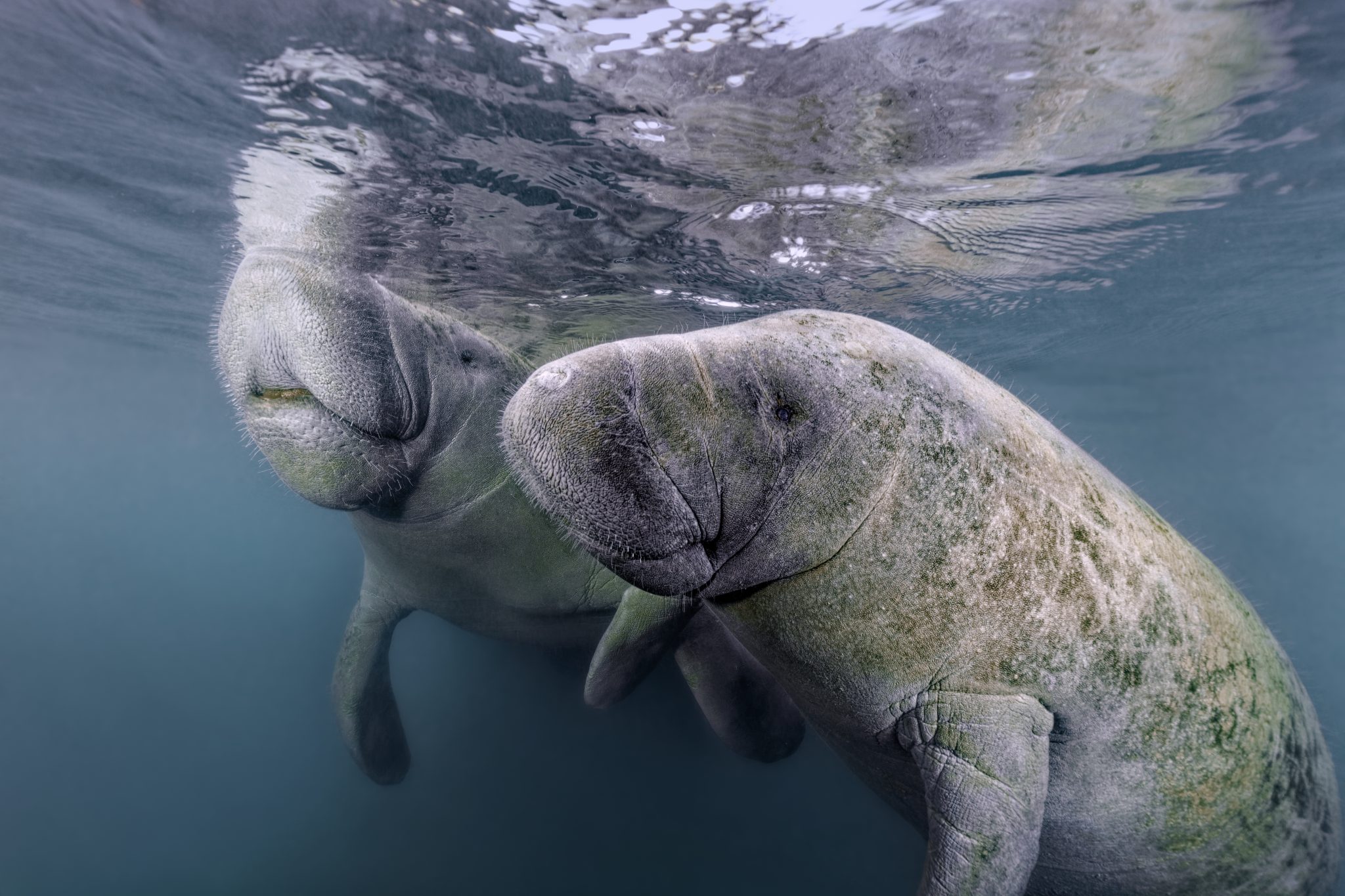
As National Safe Boating Week approaches, Save the Manatee® Club is urging boaters, and anyone that enjoys Florida’s waterways, to respect and protect the defenseless manatees that inhabit our shared waterways. From May 18 to 24, leading up to Memorial Day Weekend, the campaign aims to raise awareness about recreational boating safety and the importance of safeguarding imperiled manatees during the summer boating season. This week also emphasizes the importance of encouraging boaters to enroll in a boating safety course.
Manatees are semi-migratory marine mammals that are commonly found in shallow estuaries, bays, rivers, canals, and coastal areas throughout Florida and neighboring states. With some manatees venturing as far west as Texas and as far north as Massachusetts, collisions between these gentle giants and watercraft have become distressingly frequent. Boat propellers and high-speed collisions pose significant threats to manatees, often resulting in severe injuries or even death.
Save the Manatee Club is calling on all water enthusiasts to follow essential manatee safety tips to ensure the well-being of the imperiled manatee:
- Obey Speed Zone Signs: Familiarize yourself with and adhere to posted speed limits to prevent collisions with manatees.
- Reduce Glare with Polarized Sunglasses: Wear polarized sunglasses to enhance visibility and spot manatees below the water’s surface.
- Recognize Manatee Signs: Learn to identify signs of manatees in the area, such as swirls or flat spots on the water caused by their movements.
- Respect Manatee Sanctuaries: Keep a safe distance from posted manatee sanctuaries and avoid pursuing or harassing these marine mammals, as it is illegal and can disrupt their natural behaviors.
- Report Distressed Manatees: In Florida, promptly report distressed, injured, tagged, or orphaned manatees to the Florida Fish and Wildlife Conservation Commission (FWC) at 1-888-404-FWCC (3922). Outside of Florida, report sightings to the appropriate state agency or rescue organization. A list of agencies to contact is available at savethemanatee.org/report.
- Protect Seagrass Beds: Avoid boating over seagrass beds and shallow areas where manatees may be feeding. Stick to deep water channels while remaining vigilant, as manatees also utilize these channels during their travels.
- Dispose of Fishing Line Responsibly: Anglers should properly dispose of or recycle used fishing line to prevent entanglement hazards for manatees.
“Each year, National Safe Boating Week provides an excellent reminder for all of us to be aware that we share our waterways with vulnerable manatees,” emphasized Patrick Rose, Aquatic Biologist and Executive Director of Save the Manatee Club. “With the recent Unusual Mortality Event on Florida’s East Coast claiming an alarming number of manatees’ lives, it is more crucial than ever to prevent preventable deaths caused by watercraft collisions. By following manatee-safe boating guidelines, such as obeying speed zones and remaining vigilant for manatees, everyone on the water can contribute to the protection of these gentle giants.”
Save the Manatee Club offers a range of free materials to help safeguard manatees and raise awareness about manatee-safe boating practices. Shoreline property owners and park or marina managers can order aluminum dock signs to alert others about the presence of manatees in their areas. Boaters and paddlers can request packets containing a safety tips card, a waterproof boat banner, and a decal to display on their vessels, providing the number to report manatees in distress. To view and request these materials, visit savethemanatee.org/resources. Save the Manatee Club will also be hosting a live webinar for National Safe Boating Week on Tuesday, May 21st at 6pm EST. To register, visit savethemanatee.org/register.
Blogs
The Ocean Cleanup Breaks 10,000,000 KG Barrier

The Ocean Cleanup, the global non-profit project, has removed a verified all-time total of ten million kilograms (22 million lbs.) of trash from oceans and rivers around the world – approximately the same weight as the Eiffel Tower.
To complete its mission of ridding the oceans of plastic, The Ocean Cleanup uses a dual strategy: cleaning up the Great Pacific Garbage Patch (GPGP) to remove the plastic already afloat in the oceans, while stopping the flow of plastic from the world’s most polluting rivers.
Through cleaning operations in the GPGP and in rivers in eight countries, the cumulative total of trash removed has now surpassed ten million kilograms. This milestone demonstrates the acceleration of The Ocean Cleanup’s impact, while underlining the astonishing scale of the plastic pollution problem and the need for continued support and action.
While encouraging for the mission, this milestone is only a staging point: millions more tons of plastic still pollute our oceans and The Ocean Cleanup intends to continue learning, improving and innovating to solve this global catastrophe.
This announcement comes as governments from around the world meet to continue negotiations to develop a new legally binding instrument to end plastic pollution at INC4 in Ottawa, Canada. Representatives of The Ocean Cleanup will be in attendance and the organization will be urging decision-makers to collaborate towards a comprehensive and ambitious global treaty which addresses plastic at all stages of its life cycle and in all marine environments worldwide, including in areas beyond national jurisdiction.
It is encouraging to see that the need for remediation is reflected in the various options for potential treaty provisions. It is essential that the final treaty contains clear targets for the remediation of legacy plastic pollution, and reduction of riverine plastic emissions.
Tackling plastic pollution requires innovative and impactful solutions. The treaty should therefore incentivize the innovation ecosystem by fostering innovations that make maximal use of data, technology and scientific knowledge – such as those designed and deployed by The Ocean Cleanup.
‘After many tough years of trial and error, it’s amazing to see our work is starting to pay off – and I am proud of the team who has brought us to this point.’ said Boyan Slat, Founder and CEO of The Ocean Cleanup. ‘While we still have a long way to go, our recent successes fill us with renewed confidence that the oceans can be cleaned.’
The Ocean Cleanup was founded in 2013 and captured its first plastic in 2019, with the first confirmed catch in the GPGP coming soon after the deployment of Interceptor 001 in Jakarta, Indonesia. After surpassing one million kilograms of trash removed in early 2022, the non-profit project has since progressed to the third iteration of its GPGP cleaning solution, known as System 03, and a network of Interceptors currently covering rivers in eight countries, with more deployments set for 2024.
About The Ocean Cleanup
The Ocean Cleanup is an international non-profit organization that develops and scales technologies to rid the world’s oceans of plastic. They aim to achieve this goal through a dual strategy: stemming the inflow via rivers and cleaning up the legacy plastic that has already accumulated in the ocean. For the latter, The Ocean Cleanup develops large-scale systems to efficiently concentrate the plastic for periodic removal. This plastic is tracked and traced through DNV’s chain of custody model to certify claims of origin when recycling it into new products. To curb the tide via rivers, The Ocean Cleanup has developed Interceptor™ solutions to halt and extract riverine plastic before it reaches the ocean. Founded in 2013 by Boyan Slat, The Ocean Cleanup now employs a broadly multi-disciplined team of approximately 140. The foundation is headquartered in Rotterdam, the Netherlands.
For more information, visit: theoceancleanup.com and follow @theoceancleanup on social media.
-

 Gear Reviews4 weeks ago
Gear Reviews4 weeks agoGEAR REVIEW – Revolutionising Diving Comfort: The Sharkskin T2 Chillproof Suit
-

 Marine Life & Conservation Blogs3 months ago
Marine Life & Conservation Blogs3 months agoCreature Feature: Swell Sharks
-

 Blogs2 months ago
Blogs2 months agoMurex Resorts: Passport to Paradise!
-

 Blogs3 months ago
Blogs3 months agoDiver Discovering Whale Skeletons Beneath Ice Judged World’s Best Underwater Photograph
-

 News3 months ago
News3 months agoPADI Teams Up with Wellness Brand Neuro to Drive Ocean Change and Create a Blue State of Mind
-

 Marine Life & Conservation3 months ago
Marine Life & Conservation3 months agoSave the Manatee Club launches brand new webcams at Silver Springs State Park, Florida
-
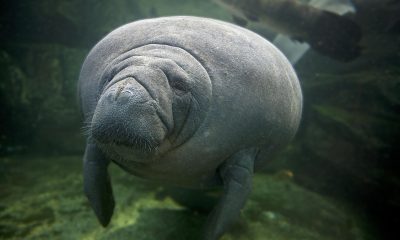
 Blogs2 months ago
Blogs2 months agoSeagrass Awareness Month brings critical food source for Manatees to centre stage
-

 Blogs3 weeks ago
Blogs3 weeks agoDive Indonesia Part 3: Dive into Lembeh Trip Report


